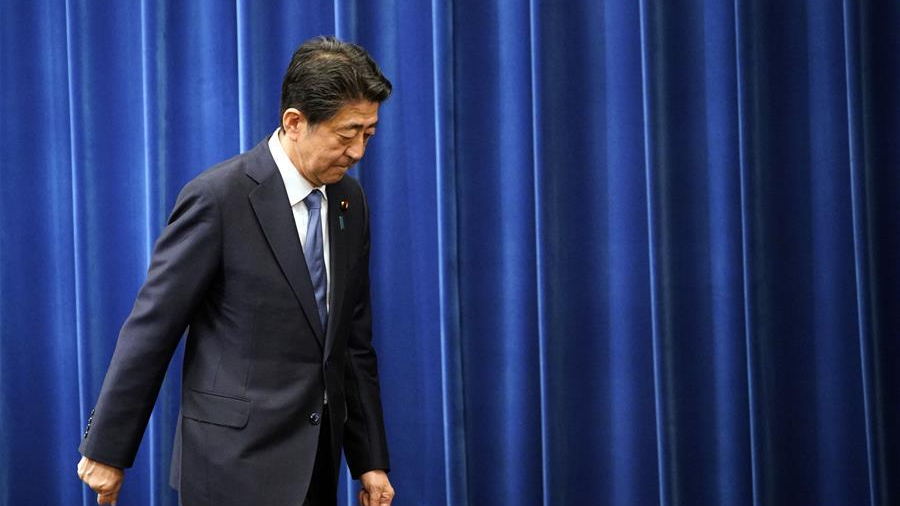
Japanese Prime Minister Shinzo Abe bows during a press conference at the prime minister official residence in Tokyo, Japan, August 28, 2020. /Pool via Xinhua
Japanese Prime Minister Shinzo Abe bows during a press conference at the prime minister official residence in Tokyo, Japan, August 28, 2020. /Pool via Xinhua
Editor's note: Freddie Reidy is a freelance writer based in London. He studied history and history of art at the University of Kent, Canterbury, specializing in Russian history and international politics. The article reflects the author's opinions, and not necessarily the views of CGTN.
While the severity of the Japanese Prime Minister Shinzo Abe's health has long been known to be serious, his resignation came as a shock to the nation and wider global community. Abe is Japan's longest serving prime minister but will leave office with many serious issues yet to be resolved.
In 2007, Abe resigned from office amid numerous political difficulties combined with the effects of ulcerative colitis, the same illness which led to his resignation on August 28, 2020.
While Japan faces many issues today, Abe's tenure will be remembered for having arrested a downward spiral since the boom of the 1980s.
After the one-year term in 2007, Abe returned to office as prime minister in 2012. Aiming to reverse the crippling deflation of the previous decades, Abe launched an aggressive policy of monetary easing, structural reform and fiscal expansion that came to be known as "Abenomics." While the policy fell short of its targeted two-percent inflation, the policy was somewhat a success.
Abe is seen to be a staunch conservative, traditionalist and nationalist. While this did present its own issues, it allowed his party, the Liberal Democratic Party (LDP), to enact reform in a way most politicians had not dared to for decades.
Agriculture, a long-time highly subsidized sector, was overhauled with increased competition. A perpetually decreasing population and mass rural-urban migration had also led to rampant labor shortages for low-income jobs, addressed by new policies easing immigration.
Abroad, Abe's legacy is mixed. The Japanese PM has secured broad acclaim for his consistency and commitment to multilateralism as well as free trade. In an age of U.S. disengagement, Abe was able to galvanize support invigorate global agreements such as the Trans-Pacific Partnership (TPP). Commenting on his resignation, Scott Morrison, Australian prime minister remarked that Abe "has been the senior statesman of our region."
On the political arena, Shinzo Abe has overseen some troubled relations connected to Japan's military past. A reluctance to engage with policies of reconciliation and reparation has led to a severe breakdown of relations with South Korea which has had great social and economic consequence. Island issues with Russia and China remain unresolved.
In 2012, after the recoveries from the ravages of an earthquake, a nuclear disaster and a recession, Abe declared during a speech in Washington that "Japan was back," emboldened by a resurgent economy and improving national sentiment.

Japanese Prime Minister Shinzo Abe leaves after a press conference in Tokyo, Japan, August 28, 2020. /Pool via Xinhua
Japanese Prime Minister Shinzo Abe leaves after a press conference in Tokyo, Japan, August 28, 2020. /Pool via Xinhua
However, in 2020, during a global pandemic, the picture is vastly different. Japan's GDP has contracted by nearly eight percent, industrial output is also lower than before he was elected and the prospect of the Tokyo Olympic Games being held in 2021, seem increasingly unlikely to lead to full recovery.
While the foundations for a swift economic recovery are there, thanks to "Abenomic" reforms, a bloody political battle and impasse could perpetuate economic recession. Japan is prone to short-lived premierships. Abe's first term was only a year long, one of six other equally short stints by political rivals.
While the race for Japan's next leader is already intensifying, Abe said he would remain in office until his successor is chosen by the ruling LDP, but he stopped short of naming his preferred successor.
At a time of crisis, it is essential that any nation's leadership has the executive authority to act decisively. If operating without full authority, it may seriously hamper the ability to make essential tough choices against COVID-19 response and economic policy.
The LDP has long been the main party in Japanese politics but it is exceptionally factional, there is no guarantee that guardians of Abe legacy such as the former Minister for Foreign Affairs Fumio Kishida, playing a role as a head of LDP policy unit would have the support to succeed him.
Besides the response to the pandemic and economic downturn, Japan's next leader will have to contend with fresh challenges on the international stage, principally relations with the United States. Mr. Abe was able to build a partnership with U.S. President Donald Trump, indeed he was chosen as the first leader to meet with the then U.S. president-elect in 2016. His successor would need to reaffirm the legacy but could also face the prospect of a new U.S. president with different foreign policy ambitions.
Japan's enduring "love affair" with cherry blossom or sakura is centered on the fleeting nature of its beauty. The blossom is delicate and at the mercy of the weather.
As Abe exhibited, in an emotional resignation speech, political careers are equally fleeting. They are at the mercy of events and are also seemingly bound to end before their time. Abe will leave office with next year's sakura season at risk, but perhaps with a greater chance than before, of blossoming.
(If you want to contribute and have specific expertise, please contact us at opinions@cgtn.com.)